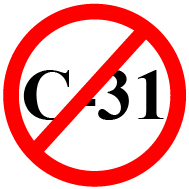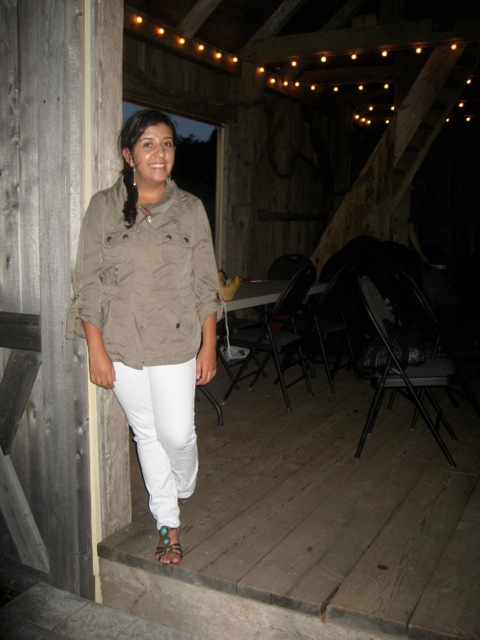|
Current issue and campaign pages: Oppose Conditional Permanent Residence for Sponsored Spouses |
|
Upcoming CCR meetings in 2012:
Summer Working Group meetings, Friday, September 7 and Saturday September 8, Montreal Fall Consultation, Thursday, November 29 - Saturday, December 1, Toronto |
Canadian Council for Refugees E-Chronicle Vol. 7 #4, 9 August 2012
CONTENTS:
- Bill C-31 becomes law, the CCR calls for an earned regularization program
- CIC seeks comments on 2013 immigration levels
- Conditional Permanent Residence to go ahead despite opposition
- Impacts of cuts to refugee health coverage
- Get involved! Participate in the CCR’s Summer Working Group meetings, 7-8 September 2012, Montreal
- Faces of the CCR: Juliana Cortes Lugo, Youth Action Gathering participant
---
 On 28 June 2012, Bill C-31, the Protecting Canada’s Immigration System Act, received royal assent and became law. We are concerned about the new law’s consequences for the protection of refugee rights in Canada. More than 38,000 refugee claimants are still waiting for decisions under the old system, so the CCR has also called on the Minister of Citizenship and Immigration to introduce an ‘Earned Regularization Program’ to manage these cases and allow these claimants the chance to remain in Canada on humanitarian and compassionate grounds.
On 28 June 2012, Bill C-31, the Protecting Canada’s Immigration System Act, received royal assent and became law. We are concerned about the new law’s consequences for the protection of refugee rights in Canada. More than 38,000 refugee claimants are still waiting for decisions under the old system, so the CCR has also called on the Minister of Citizenship and Immigration to introduce an ‘Earned Regularization Program’ to manage these cases and allow these claimants the chance to remain in Canada on humanitarian and compassionate grounds.
About Bill C-31
Now law, Bill C-31, also known as the Protecting Canada’s Immigration System Act - was introduced in parliament on February 16, 2012. Many elements of the bill have raised serious concerns among those who work with refugees and legal experts. These include:
- Impossibly Tight Timelines for preparation of refugee hearings and for processing refugee claims.
- ‘Designated Countries of Origin’, to be identified at the minister’s discretion, will push people from those countries through the system more quickly than others.
- ‘Irregular Arrivals’ (groups of 2 or more identified at the government’s discretion) will face mandatory detention under the new law.
- Barriers to Appeal: The implementation of the Refugee Appeal Division is an important development in Canada’s refugee system, but an appeal will be inaccessible to ‘Irregular Arrivals’ and to refugees from ‘Designated Countries of Origin’.
About the proposed Earned Regularization Program
In 2009, the Auditor General of Canada attributed the growth of the backlog to a high vacancy rate at the Immigration and Refugee Board. Earned Regularization Programs have previous been implemented by Canada and other countries to deal with immigration and refugee backlogs.
The program called for by the CCR would take into consideration the following criteria for humanitarian and compassionate (H&C) consideration:
- Successful integration: Integration would be reviewed taking into consideration not only economic integration, but also factors such as social, cultural and familial integration (i.e. links with the communities in which people without status live, learn, work and worship).
- Length of time in Canada: Length of time in Canada is a factor in favour of granting regularization. Those who have been continuously in Canada for three years should normally be landed. However, the fact that a person has not been long in Canada should not be an argument against landing when there are any other H&C factors.
- Survival of rape and torture: Persons who have survived rape or torture should normally be granted H&C to avoid return to the country of their traumatization.
- Domestic violence: Persons who have left a relationship with a sponsor because of domestic violence should normally be granted H&C.
- Statelessness: The fact that a person is de jure or de facto stateless should in itself be a deciding factor in favour of H&C.
- Rights of the individual: All applications should be reviewed against the background of Canada’s international instruments and Charter obligations in order to protect the economic, social, cultural, civil and political rights of the individual.
- Third-party sponsorship: the presence of a sponsor – e.g. an employer, a labour union, faith group, community or non-governmental organization - that would be able to both vouch for the applicant, as well as support their continued integration in Canada. Immediate and extended family members could be potential sponsors.
For the press release, see: http://ccrweb.ca/en/bulletin/12/06/29
For more information about Bill C-31, see: http://ccrweb.ca/en/refugee-reform
Citizenship and Immigration Canada (CIC) is holding consultations via online questionnaire to seek feedback on immigration issues, including the appropriate level of immigration for Canada, and the most suitable mix among economic, family, and refugee and humanitarian classes. The questionnaire is open for public response until August 31, 2012.
These consultations are billed to be a part of “CIC’s transition towards a faster and more flexible immigration system, as well as the growing importance of immigration to Canada’s economic growth and long-term prosperity.”
The CCR has significant concerns with this approach to determining Canada’s priorities for welcoming newcomers.
We encourage you to take this opportunity to give feedback on what you want for Canada’s immigration and refugee systems. The CCR has prepared a set of CCR priorities for levels planning 2013 that you can refer to when responding.
Along with the online public consultations, two Members of Parliament are carrying out a series of cross-country consultations in Windsor, Vancouver, Halifax and Ottawa with stakeholders and the public to discuss the appropriate level and mix of immigration for Canada in the coming years. However, these consultations are by invitation only.
 Media reports state that this fall the federal government plans to implement a period of conditional permanent residence of at least two years for sponsored spouses. This will also apply to partners who have been in the relationship with their sponsor for less than two years. According to the proposal, if the sponsored spouse or partner does not remain in a conjugal relationship and live with their sponsor during the entire conditional period, their permanent resident status could be revoked, and they could be deported.
Media reports state that this fall the federal government plans to implement a period of conditional permanent residence of at least two years for sponsored spouses. This will also apply to partners who have been in the relationship with their sponsor for less than two years. According to the proposal, if the sponsored spouse or partner does not remain in a conjugal relationship and live with their sponsor during the entire conditional period, their permanent resident status could be revoked, and they could be deported.
The CCR has opposed this change since it was first announced in March 2011 because it puts sponsored women at increased risk of violence and manipulation. Women in situations of abuse will be forced to stay in their relationships so that they don’t upset their chances of obtaining permanent residence status in Canada. The proposal was revised to exempt women in abusive relationships, however the CCR believes this exemption will be ineffective. Why? Abuse is hard to prove. The burden of proof is on the abused partner. Newcomer women often don’t know their rights. Language barriers exist. And the costs of providing proof are high.
To read more visit the CCR campaign page on conditional permanent residence.
It is still important express your opposition to this harmful change. Visit your Member of Parliament, share information with others, and get other ideas from the CCR take action page.
Cuts to the Interim Federal Health program for refugee claimants, refugees and others came into effect at the end of June. As anticipated, the CCR is hearing reports of cases that highlight problems with the changes. We are working together with others, including medical and legal professionals, to address these issues strategically.
We’ll feature updates on these changes and ideas on what you can do in future issues of the Chronicle.
For more information:
Government information on refugee healthcare changes is misleading, may be fatal: http://ccrweb.ca/en/bulletin/12/05/03
Changes to healthcare for refugee claimants and protected persons inhumane: http://ccrweb.ca/en/bulletin/12/04/27

End your summer the right(s) way! Come to the CCR Summer Working Group meetings in Montreal 7 and 8 September 2012.
CCR members and allies are encouraged to attend the Working Group meetings. The meetings are closed to media and government. There is no cost to participate and no registration is necessary.
The meeting schedule is:
FRIDAY 7 SEPTEMBER: 9:30am - 5pm:
Overseas Protection & Sponsorship Working Group meeting
SATURDAY 8 SEPTEMBER:
9:30am - 5pm: Inland Protection Working Group meeting
9:30am - 5pm: Immigration and Settlement Working Group meeting
For more information about the Working Group meetings, where they are, and how to get there, see: http://ccrweb.ca/meetings
And there’s more…
François Crépeau, UN Special Rapporteur on the Rights of Migrants will be joining us for a special presentation on Migrants’ Rights in the International Agenda: Goals and limitations of the mandate of the UN Special Rapporteur
Friday 7 September, 6-7:30 pm (following the Working Group meetings)
Fulford Hall (2nd floor), Anglican Diocese of Montreal, 1444 Union Street, Montreal
Free admission – no registration required
The United Nations system has recently shown interest in migrants’ rights, but progress is slow. States are fiercely defending their sovereign powers in the field and are wary of a UN institution leading them in a direction contrary to their interests.
François Crépeau will speak about how his office can influence States in adopting appropriate migration policies. Find out how, as Special Rapporteur, he tries to bridge the gap between States’ perceived interests and the expectations of civil society actors. Professor Crépeau’s talk is a must for anyone working on migrant rights issues in Canada and/or abroad.
The first Canadian Council for Refugees Youth Action Gathering will take place from 31 August – 2 September in Montreal. The Gathering will bring newcomer youth and allies from across the country together to do what youth to best: Inspire! Create! Share! And most importantly, to work together to create the kind of communities that we want to live in.
 Juliana Cortes Lugo is a university student and an active volunteer with newcomer youth. She has also just completed a one-year term as a CCR Youth Ambassador. After creating a branch of the Youth Network in Edmonton, Juliana is gearing up for her next challenge: the Youth Action Gathering (YAG)!
Juliana Cortes Lugo is a university student and an active volunteer with newcomer youth. She has also just completed a one-year term as a CCR Youth Ambassador. After creating a branch of the Youth Network in Edmonton, Juliana is gearing up for her next challenge: the Youth Action Gathering (YAG)!
“The Youth Action Gathering is probably the biggest project the CCR Youth Network has taken on. I’m really excited about it because it gives an opportunity to newcomer youth and allies to get together and learn from each other,” says Juliana. She plays an important role on the Youth Action Gathering team as an organizer and workshop planner.
When asked what challenges for newcomer youth she would most like to see addressed, Juliana’s reply is simple: education. “Education is just one aspect affected by immigration policies; however, I believe that it is a factor that determines the overall success of all newcomers. Sadly, unequal access to education and other services divides society.” The YAG is designed to allow newcomer youth to explore inequalities they face – in school, in finding work, in accessing social services and much more. “It provides a space to talk about issues, how to address them and, most importantly, to see that we are not alone, that we can count on each other’s support,” concludes Juliana.
Want to get involved with the CCR Youth Network? Participants for this year’s YAG have already been chosen, but the Youth Network plans to make it a yearly event. While waiting for the 2013 YAG, interested youth between 15 and 25 can:
- Participate in Speak Up, a small grants program to develop creative community projects by and for newcomer youth
- Come to a CCR national Consultation as a youth delegate to discuss issues affecting newcomers and to find out how newcomers are making a difference throughout Canada
- Join a Youth Network conference call to connect with other newcomer youth and youth allies from across Canada. For more information, send an email to Chloe Raxlen, CCR Youth Coordinator at: craxlen@ccrweb.ca
Looking for other ways to stay in touch with the CCR and refugee and immigration issues? Subscribe to receive updates from the CCR on Twitter and Facebook:
To join the CCR on Facebook: http://www.facebook.com/ccrweb
To follow the CCR on Twitter: http://twitter.com/ccrweb
To view CCR videos on YouTube: http://www.youtube.com/ccrwebvideos
